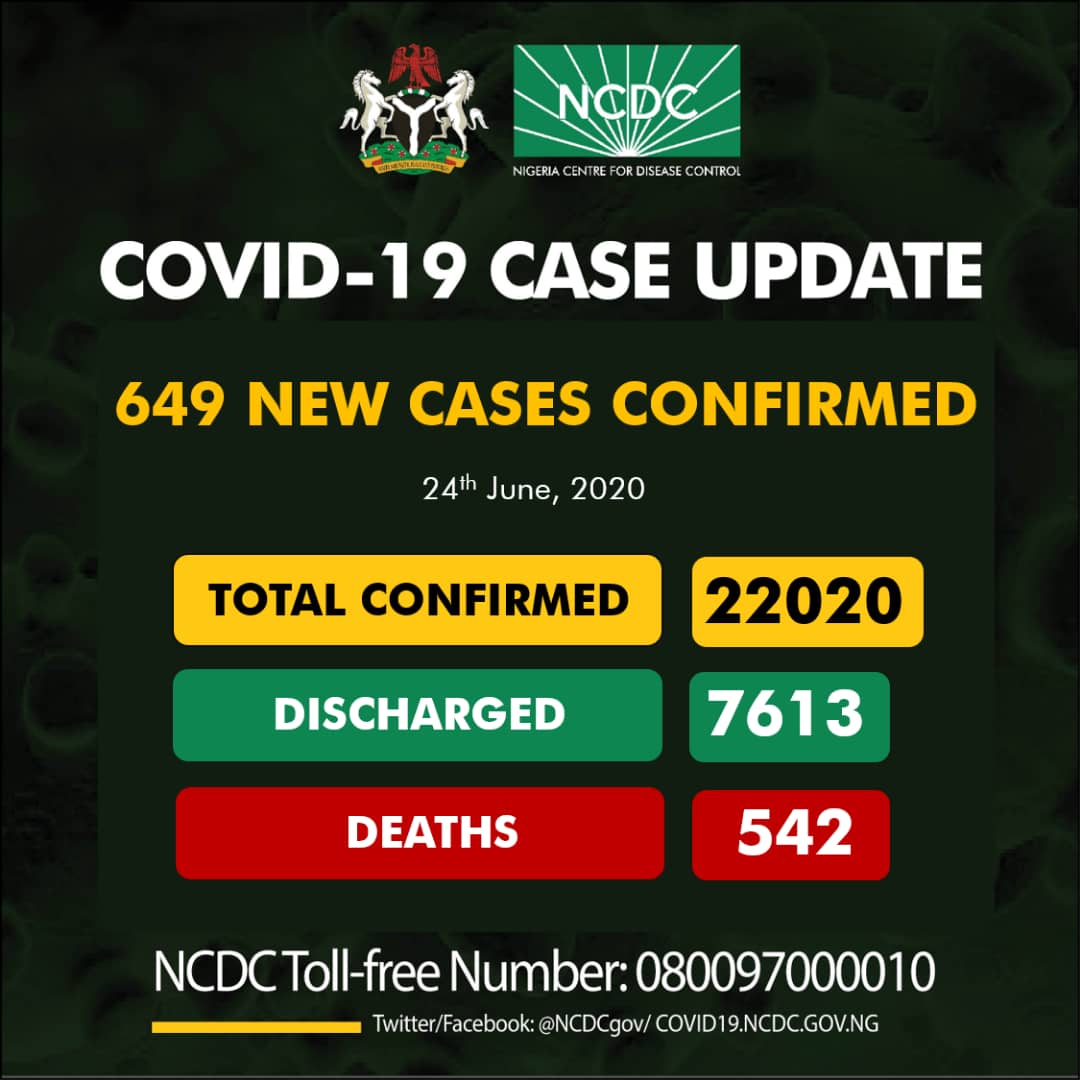Nigeria yesterday recorded 649 new cases of COVID-19, bringing to 22,020, the number of confirmed cases in the country
However, UK has commenced human trial of a COVID-19 vaccine developed by a team of researchers from the Imperial College in London.
This is coming as about 500 employees of Atlanta-based Delta Airlines have tested positive for the virus.
Announcing the new cases yesterday, the Nigeria Centre for Disease Control (NCDC) said Lagos recorded 250 new cases; Oyo, 100; Plateau and Delta, 40 each; Abia, 28; Kaduna, 27; Ogun, 22; Edo, 20; Akwa Ibom, 18; Kwara and Federal Capital Territory (FCT), 17 each; Enugu, 14; Niger and Adamawa, 13 each; Bayelsa, seven; Osun and Bauchi, six each; Anambra, four; Gombe, three; Sokoto, two; while Imo and Kano, one each.
It said: “Nigeria has recorded 22,020 cases of COVID-19. 7,613 persons have been discharged, while 542 persons have died.”
Meanwhile, a COVID-19 vaccine trial on humans has begun in the United Kingdom.
The vaccine is developed by a team of researchers from the Imperial College, London and this is the first time it will be tested on humans.
The first volunteer has received a small dose of the vaccine and is said to be in stable condition while under close monitoring at a facility in West London.
On how the vaccine works against COVID-19, it will “train the body’s immune system to recognise the virus and help it to defend itself against a future attack” using “bits of genetic code (called self-amplifying RNA), rather than bits of the virus”.
“The aim of the vaccine is to trick the body into thinking it has already seen the virus and made an immune response, so when you come into contact with it in real life, you should already be immune.”
A first dose will also be administered to several other people over the next few days, while the second dose will be given within one month.
A total of 300 people have volunteered to participate in the trial in the initial phase.
The research team is led by a professor at Imperial College, Robin Shattock.
“The first participant marks an important step for our saRNA vaccine platform, which has never before been trialled in humans,” Shattock is quoted as saying in an article on the trial process on the college’s website.
“We now eagerly await rapid recruitment to the trial so that we can assess both the safety of the vaccine and its ability to produce neutralising antibodies which would indicate an effective response against COVID-19. I look forward to our progress in the coming months.”
The development of the vaccine has received more than £41 million in funding from the UK government and another £5 million in donations by philanthropists.
Speaking on the vaccine, Katrina Pollock of the department of infectious disease and chief investigator of the study, said: “We have reached a significant milestone in this ground-breaking study with the first dose of a self-amplifying RNA vaccine delivered safely.
“We are now poised to test the vaccine in the dose evaluation phase before moving forward to evaluating it in larger numbers.”
The UK Medical Research Council, UK Research and Innovation, the Department of Health and Social Care, the Department for Business, Energy and Industrial Strategy, the National Institute for Health Research, among others have supported the research effort.
“This astonishingly fast vaccine development – compared to the years it normally takes – is a result of the remarkably hard and collaborative work of the scientists, trialists and regulators,” Fiona Watt, professor and executive chair of the medical research council, said.
“These human trials will contribute to global efforts to find a vaccine, which is our best hope for preventing COVID-19 and enabling life to return to normal.”
In another development, about 500 employees of Atlanta-based Delta Airlines have tested positive for COVID-19.
Chief Executive Officer of the airline, Ed Bastian confirmed the spread of the disease among its employees during the company’s annual shareholder meeting.
The Cable reported that Bastian said 10 employees have also died from the disease.
“We lost 10 employees to the coronavirus; every one of them breaks my heart,” he said.
“Among other 500 employees who contracted the virus, the vast majority have recovered.”
He added that the airline is testing its approximately 90,000 employees for COVID-19 and “we will be able to provide better protection for our people and then, eventually, certainly, our customers as we go forward.”
On the economic impact of the pandemic, Bastian said the aviation industry has been hit badly.
“We shut operations in 10 airports since May until at least September,” he said.
“We could never have predicted how quickly the coronavirus pandemic would upend our plans as demand for near-term air travel dropped to almost zero in a matter of weeks.
“We are realistic that the timing and shape of revenue recovery are uncertain and are prepared that it could take up to two to three years to return to a new level of normal, which could still be lower than 2019 revenue base.”


